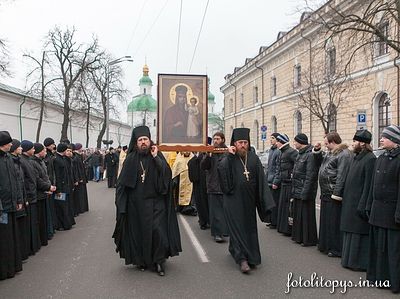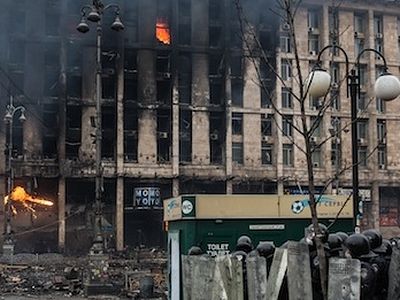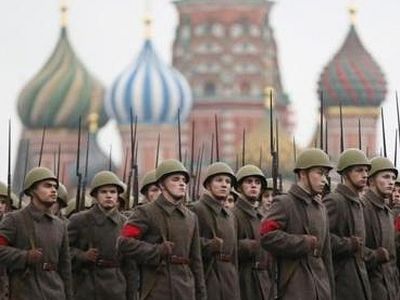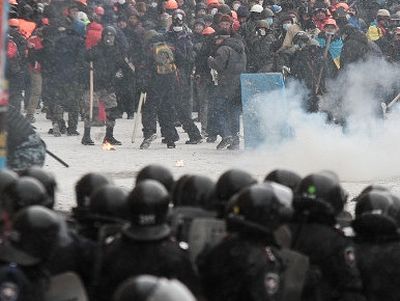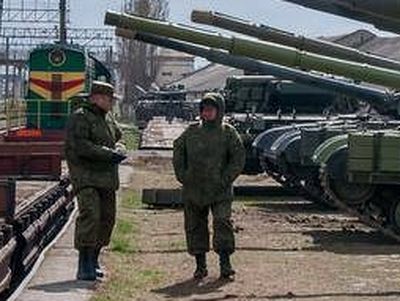Source: The American
Conservative
By James Carden
When the old order begins to fall apart, many of the vociferous men of words, who prayed so long for the day, are in a funk – Eric Hoffer, True Believer
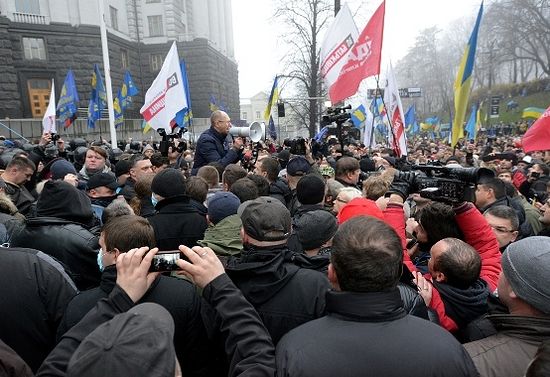 Current Ukrainian PM Arseniy Yatsenyuk rallies protesters in Ukraine last fall. Ivan Bandura / Flickr
Current Ukrainian PM Arseniy Yatsenyuk rallies protesters in Ukraine last fall. Ivan Bandura / Flickr
The news of late out of eastern Ukraine is laden with irony. Those of us possessed of a realist disposition—I use the term “disposition” advisedly, for as the theologian Reinhold Niebuhr noted in his essay “Augustine’s Political Realism,” definitions of realists “emphasize disposition, rather than doctrines”—are not terribly surprised that the recently installed regime in Kiev has set in motion a revolution it now finds itself unable to control. As history shows, that’s the trouble with revolutions: once begun, efforts to predict—much less control—their path are often fruitless.
What we are seeing taking place in the eastern provinces of Ukraine shouldn’t be terribly surprising, after all—the erroneous, yet seductive phrase “one Ukrainian people” that has been uttered over and over again by American and European diplomats, was always a fiction. So the new regime in Kiev finds itself in an analogous position to the one the Yanukovych government found itself in late 2013-early 2014; it faces popular dissatisfaction that expresses itself in the street (we have thankfully—thus far anyway—been spared the term “the Ukrainian street”).
There are a few differences between the oft-praised Euro-Maidan and the pro-Russian demonstrations now taking place across the East; the first being that the latter have actually been peaceful (so far). The nature of the regimes against which the respective protests were aimed are different as well; one, Yanukovych’s, was democratically elected in 2010, the government headed by Arseniy Yatsenyuk (or, as he was referred to in honeyed tones by Assistant Secretary of State Victoria Nuland, “Yats”) was imposed by acts of violence and coercion. Another difference can be spotted in the reactions of the American media to the two movements. Proving the American media is nothing if not nimble, solidarity for the aspirations of the “Ukrainian people” during the Maidan riots has now morphed—in nary a blink of an eye—to scorn for protesters in the east who are obviously tools of the Kremlin.
And so if the protagonists of the Ukrainian revolution and their Western cheerleaders aren’t “in a funk,” perhaps they ought to be, for developments are not proving very favorable at present. In addition to the restive populations in urban centers like Donetsk and Kharkiv, Vladimir Putin is playing a strong hand well. He recently issued a letter to 18 European leaders urging them to provide Ukraine with financial assistance to avoid a shutdown of Russian gas supplies to Europe; economic leverage is joined by military leverage: Russia has amassed over 40,000 troops on its western border with Ukraine; and last but not least, Russia is busy consolidating its hold over Crimea. Indeed, this week the Russian government announced it was exploring the possibility of investing upwards of $1 billion toward developing the Crimean wine industry.
The Western response to all this has been to issue a handful of visa bans and to sanction a smallish Russian private bank. Calls by some of our more martial-minded elected representatives (read: John McCain) to arm the new Ukrainian regime have been met with little enthusiasm from the State Department.
Yet in the face of all this, neoconservative enthusiasm for ever deepening American involvement continues unabated—the Russian government has accused the military contractor Greystone of sending mercenaries to assist the Kiev regime, and neoconservative prodigal son David Frum bravely parachuted into Kiev to assure the readers of The Atlantic that concerns over fascist and neo-Nazi elements within and without the new Ukrainian government are baseless; his message: there’s nothing to see here folks.
The problems associated with promoting “democratic revolutions” go unremarked upon by the Washington establishment. Yet even a casual student of history knows that the problem with revolutions generally is that—like any ordinary street brawl—one never really knows for sure how things will end. A question that we might do well to ponder in the coming days: Why is it that so many American journalists and politicians favor provocation over prudence, and conflict over conciliation regarding the continuing crisis in Ukraine?
